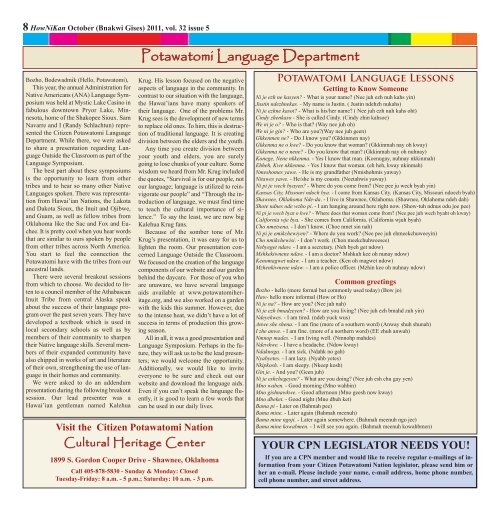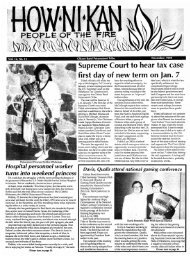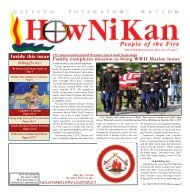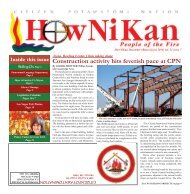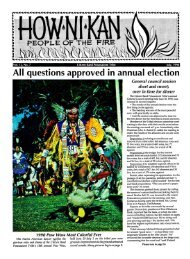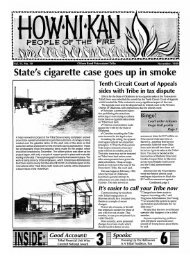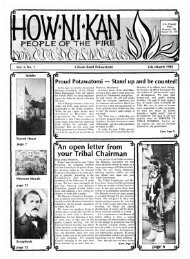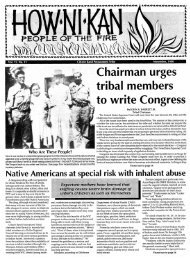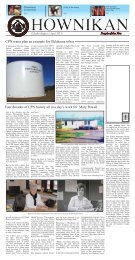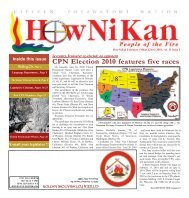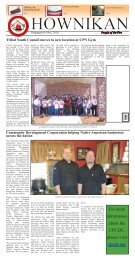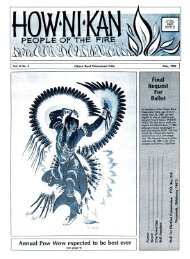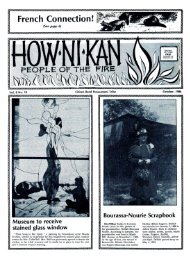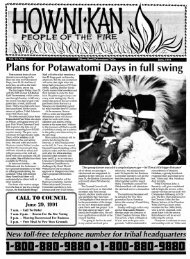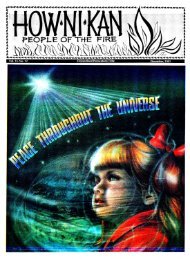October 2011 - Citizen Potawatomi Nation
October 2011 - Citizen Potawatomi Nation
October 2011 - Citizen Potawatomi Nation
Create successful ePaper yourself
Turn your PDF publications into a flip-book with our unique Google optimized e-Paper software.
8 HowNiKan <strong>October</strong> (Bnakwi Gises) <strong>2011</strong>, vol. 32 issue 5<br />
<strong>Potawatomi</strong> Language Department<br />
Bozho, Bodewadmik (Hello, <strong>Potawatomi</strong>),<br />
This year, the annual Administration for<br />
Native Americans (ANA) Language Symposium<br />
was held at Mystic Lake Casino in<br />
fabulous downtown Pryor Lake, Minnesota,<br />
home of the Shakopee Sioux. Sam<br />
Navarre and I (Randy Schlachtun) represented<br />
the <strong>Citizen</strong> <strong>Potawatomi</strong> Language<br />
Department. While there, we were asked<br />
to share a presentation regarding Language<br />
Outside the Classroom as part of the<br />
Language Symposium.<br />
The best part about these symposiums<br />
is the opportunity to learn from other<br />
tribes and to hear so many other Native<br />
Languages spoken. There was representation<br />
from Hawai’ian <strong>Nation</strong>s, the Lakota<br />
and Dakota Sioux, the Inuit and Ojibwe,<br />
and Guam, as well as fellow tribes from<br />
Oklahoma like the Sac and Fox and Euchee.<br />
It is pretty cool when you hear words<br />
that are similar to ours spoken by people<br />
from other tribes across North America.<br />
You start to feel the connection the<br />
<strong>Potawatomi</strong> have with the tribes from our<br />
ancestral lands.<br />
There were several breakout sessions<br />
from which to choose. We decided to listen<br />
to a council member of the Athabascan<br />
Inuit Tribe from central Alaska speak<br />
about the success of their language program<br />
over the past seven years. They have<br />
developed a textbook which is used in<br />
local secondary schools as well as by<br />
members of their community to sharpen<br />
their Native language skills. Several members<br />
of their expanded community have<br />
also chipped in works of art and literature<br />
of their own, strengthening the use of language<br />
in their homes and community.<br />
We were asked to do an addendum<br />
presentation during the following breakout<br />
session. Our lead presenter was a<br />
Hawai’ian gentleman named Kalehua<br />
Krug. His lesson focused on the negative<br />
aspects of language in the community. In<br />
contrast to our situation with the language,<br />
the Hawai’ians have many speakers of<br />
their language. One of the problems Mr.<br />
Krug sees is the development of new terms<br />
to replace old ones. To him, this is destruction<br />
of traditional language. It is creating<br />
division between the elders and the youth.<br />
Any time you create division between<br />
your youth and elders, you are surely<br />
going to lose chunks of your culture. Some<br />
wisdom we heard from Mr. Krug included<br />
the quotes, “Survival is for our people, not<br />
our language; language is utilized to reinvigorate<br />
our people” and “Through the introduction<br />
of language, we must find time<br />
to teach the cultural importance of silence.”<br />
To say the least, we are now big<br />
Kalehua Krug fans.<br />
Because of the somber tone of Mr.<br />
Krug’s presentation, it was easy for us to<br />
lighten the room. Our presentation concerned<br />
Language Outside the Classroom.<br />
We focused on the creation of the language<br />
components of our website and our garden<br />
behind the daycare. For those of you who<br />
are unaware, we have several language<br />
aids available at www.potawatomiheritage.org,<br />
and we also worked on a garden<br />
with the kids this summer. However, due<br />
to the intense heat, we didn’t have a lot of<br />
success in terms of production this growing<br />
season.<br />
All in all, it was a good presentation and<br />
Language Symposium. Perhaps in the future,<br />
they will ask us to be the lead presenters;<br />
we would welcome the opportunity.<br />
Additionally, we would like to invite<br />
everyone to be sure and check out our<br />
website and download the language aids.<br />
Even if you can’t speak the language fluently,<br />
it is good to learn a few words that<br />
can be used in our daily lives.<br />
Visit the <strong>Citizen</strong> <strong>Potawatomi</strong> <strong>Nation</strong><br />
Cultural Heritage Center<br />
1899 S. Gordon Cooper Drive - Shawnee, Oklahoma<br />
Call 405-878-5830 - Sunday & Monday: Closed<br />
Tuesday-Friday: 8 a.m. - 5 p.m.; Saturday: 10 a.m. - 3 p.m.<br />
<strong>Potawatomi</strong> Language Lessons<br />
Getting to Know Someone<br />
Ni je ezh ne kasyen? - What is your name? (Nee juh ezh nuh kahs yin)<br />
Justin ndezhnekas. - My name is Justin. ( Justin ndehzh nukahs)<br />
Ni je ezhne kasot? - What is his/her name? ( Nee juh ezh nuh kahs oht)<br />
Cindy zhenkaso - She is called Cindy. (Cindy zhin kahsoe)<br />
We ni je o? - Who is that? (Way nee juh oh)<br />
We ni je gin? - Who are you?(Way nee juh geen)<br />
Gkkenmen ne? - Do I know you? (Gkkinmen nay)<br />
Gkkenma ne o kwe? - Do you know that woman? (Gkkinmah nay oh kway)<br />
Gkkenma ne o nene? - Do you know that man? (Gkkinmah nay oh nuhnay)<br />
Konege, Nene nkkenma. - Yes I know that man. (Koenugay, nuhnay nkkinmah)<br />
Ehheh, Kwe nkkenma. - Yes I know that woman. (eh heh, kway nkinmah)<br />
Nmeshomes yawe. - He is my grandfather (Nmishohmis yaway)<br />
Nitawes yawe. - He/she is my cousin. (Neetahwis yaway)<br />
Ni pi je wech byayen? - Where do you come from? (Nee pee ju wech byah yin)<br />
Kansas City, Missouri ndoch bya. - I come from Kansas City. (Kansas City, Missouri ndoech byah)<br />
Shawnee, Oklahoma Nde-da. - I live in Shawnee, Oklahoma. (Shawnee, Oklahoma ndeh dah)<br />
Shote ndnes ode wzho pi. - I am hanging around here right now. (Show-tuh ndnus odu joe pee)<br />
Ni pi je wech byat o kwe? - Where does that woman come from? (Nee pee juh wech byaht oh kway)<br />
California wje bya. - She comes from California. (California wjuh byah)<br />
Cho nmetsena. - I don’t know. (Choe nmet sin nah)<br />
Ni pi je emikchewiyen? - Where do you work? (Nee pee juh ehmeekchuweeyin)<br />
Cho nmikchewisi. - I don’t work. (Chon meekchuhweesee)<br />
Nebyeget ndaw. - I am a secretary. (Neh byeh get ndow)<br />
Mshkekiwnene ndaw. - I am a doctor? Mshkuh kee oh nunay ndow)<br />
Kenomagwet ndaw. - I am a teacher. (Ken oh magwet ndow)<br />
Mzhenkiwnene ndaw. - I am a police officer. (Mzhin kee oh nuhnay ndow)<br />
Common greetings<br />
Bozho - hello (more formal but commonly used today) (Bow jo)<br />
Haw- hello more informal (How or Ho)<br />
Ni je na? - How are you? (Nee juh nah)<br />
Ni je ezh bmadzeyen? - How are you living? (Nee juh ezh bmahd zuh yin)<br />
Ndeyekwes. - I am tired. (ndeh yuck wus)<br />
Anwe she shena. - I am fine (more of a southern word) (Anway shuh shunah)<br />
I zhe anwe. - I am fine. (more of a northern word) (EE zhuh anwuh)<br />
Nmnop mades. - I am living well. (Nmnohp mahdes)<br />
Ndewkwe. - I have a headache. (Ndow kway)<br />
Ndaknoga. - I am sick. (Ndahk no gah)<br />
Nyabyetes. - I am lazy. (Nyahb yetes)<br />
Nkipkosh. - I am sleepy. (Nkeep kosh)<br />
Gin je. - And you? (Geen juh)<br />
Ni je eshchegeyen? - What are you doing? (Nee juh esh chu gay yen)<br />
Mno waben. - Good morning (Mno wahbin)<br />
Mno gishnawkwe. - Good afternoon (Mno geesh now kway)<br />
Mno dbeket. - Good night (Mno dbuh ket)<br />
Bama pi - Later on (Bahmah pee)<br />
Bama mine. - Later again (Bahmah meenuh)<br />
Bama mine ngoji. - Later again somewhere. (Bahmah meenuh ngo jee)<br />
Bama mine kowabmen. - I will see you again. (Bahmah meenuh kowahbmen)<br />
YOUR CPN LEGISLATOR NEEDS YOU!<br />
If you are a CPN member and would like to receive regular e-mailings of information<br />
from your <strong>Citizen</strong> <strong>Potawatomi</strong> <strong>Nation</strong> legislator, please send him or<br />
her an e-mail. Please include your name, e-mail address, home phone number,<br />
cell phone number, and street address.


